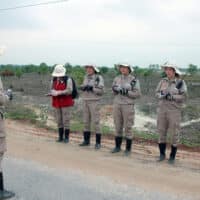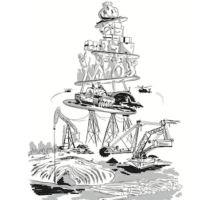-
Tough on Institutions, not Individuals: Resisting Militarism in Engineering Schools
The scale and pace of the genocide in Gaza is accelerated by the direct and indirect contributions of American universities.
-
Smashing walls, building firewalls, and breaking the digital siege
On October 7, 2023, the Palestinian resistance in Gaza launched Operation Al-Aqsa Flood—a mass breakout from the open-air concentration camp in which 2.3 million people had been confined by seventy-five years of Zionist colonialism and sixteen years of unrelenting siege.
-
Old contradictions and new possibilities in Marxist and Indigenous praxis
At the 2017 March for Science in Washington, DC , Dr. Lydia Jennings wore a T-shirt that read, “Strong Resilient Indigenous,” and held a sign saying, “Traditional Ecological Knowledge Is Science Too!”
-
The struggle for University divestment in the age of finance capital
The boundaries that separate higher education from “the rest” of the capitalist economy have eroded, imperfectly and unevenly but to a sufficient extent that the systemic force of financial markets dictates investment decisions and makes universities hard to distinguish from banks.
-
The invention of the “true transsexual”
The following text navigates through the trans health articles and books published between 1886 and 1966 which appear to have had the greatest influence on the writing of “The Transsexual Phenomenon”, ultimately posing the question: how did we get here?
-
Land back at Barnhart
Contextualizing the Re-occupation of Barnhart Island in Shared Legacies of Struggle.
-
Akwesasne and the history of hydropower
Hydropower has long been heralded as “clean,” “green” energy. Yet living in Akwesasne, just a few kilometers away from the Moses-Saunders Power Dam, it seems that almost every one of its approximately 13,000 residents is either sick or has a family member that is sick.
-
A mirror of our immediate future
On Green Imperialism and Palestine.
-
Sequencing Revolt: How Grandmothers Fought the Argentinian Military Dictatorship and Revolutionized Science
The dictatorship in Argentina—one of the cruelest and bloodiest in the region—was in full swing. Among the thirty thousand disappeared by the state were an estimated five hundred babies and children, either taken along with their parents or born in the camps under brutal, inhumane conditions. Their grandmothers would do anything to find them.
-
Degrowth and ecosocialist revolution
It is becoming increasingly clear that humanity cannot resolve the anthropogenic ecological crises without radically restructuring our social relations—a consensus shared by the degrowth movement and revolutionary socialism. Panel Discussion at Socialism 2023
-
Healing the wounds of War in Vietnam
From 1964 to 1973, the United States released 6,162,000 tons of bombs and other ordnance in Indochina, far greater than the combined amount during the Second World War and the Korean War.
-
Lie, cheat, and steal: The CIA’s disastrous scientific legacy
Under the leadership of noted black site torture overseer Gina Haspel, it has also adopted a tech start-up model via its new “CIA Labs,” which entices would-be innovators with lucrative patent opportunities.
-
Science and imperialism: Scientists as workers for peace
Imperialism and militarism have always disguised and justified themselves as the defense of freedom.
-
Resisting AFRICOM and beyond
An Interview with Rose Brewer of Black Alliance for Peace.
-
The U.S. Navy and climate change
If one were only to read the headlines over the last two years, it might seem as if the U.S. military is late to the problem of climate change. However, as a large emitter of greenhouse gasses (51 million metric tons of CO2 equivalents in 2019 alone), the U.S. military has been researching, anticipating, and planning for the effects of climate change for decades.
-
Killing in the name of precision
The Technoscientific Origins of Drone Warfare.
-
The U.S. blockade and its effects on Cuban medicine
The Cuban socialist healthcare system is internationally recognized as one of the best in the world.
-
How degrowth can help reduce global conflict
Defined as an equitable and democratic reduction of energy and material throughput targeted at rich nations and the globally wealthy, degrowth has grown in popularity over the last few years with growing political support.
-
Extractivism in the Anthropocene
Late Imperialism and the Expropriation of the Earth.
-
Fossil Drugs: Antibiotics as the fossil fuels of medicine
Though now one of the most famous and ubiquitous antibiotics, penicillin was once so scarce that doctors had to recycle it from their patients’ urine for reinjection. But once mass production was possible, such restraint ended. Today, antibiotic use is astonishingly inefficient.




















